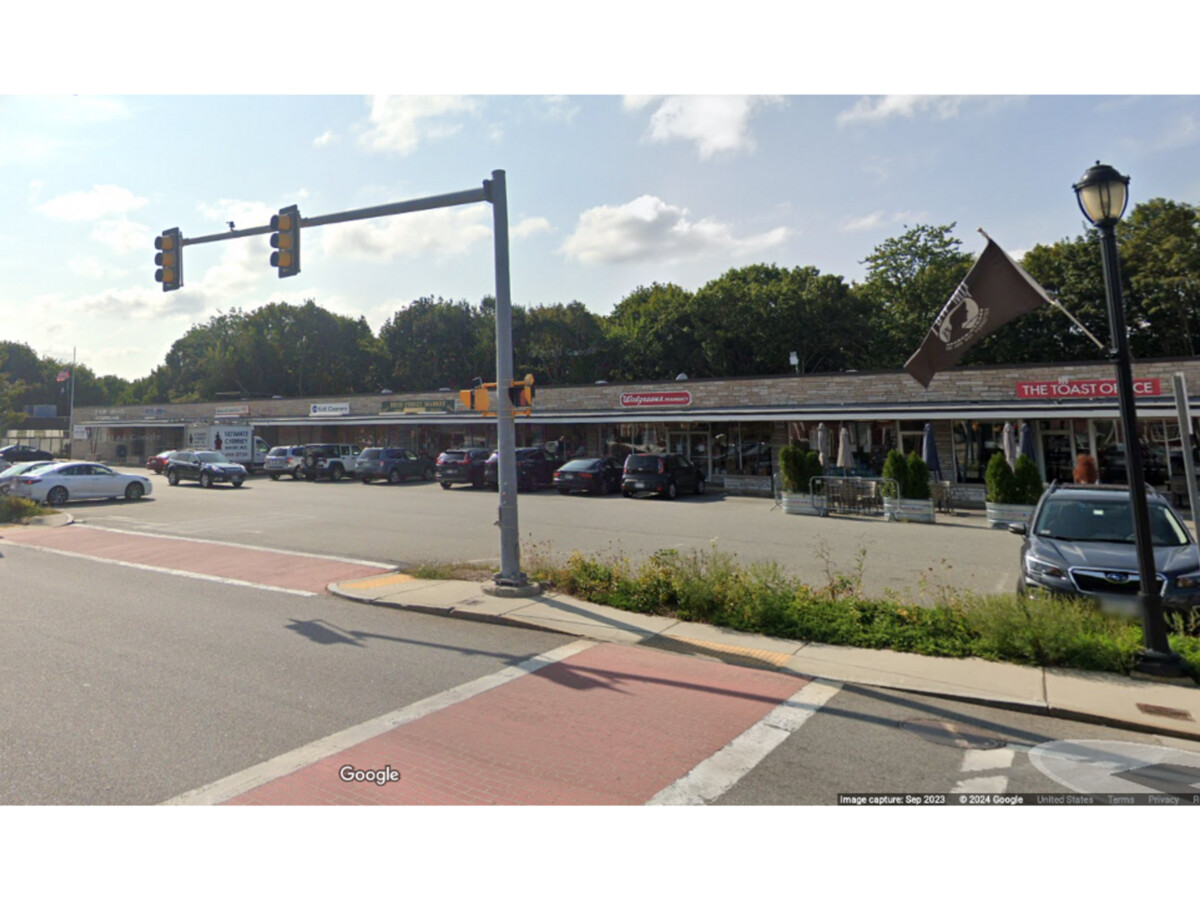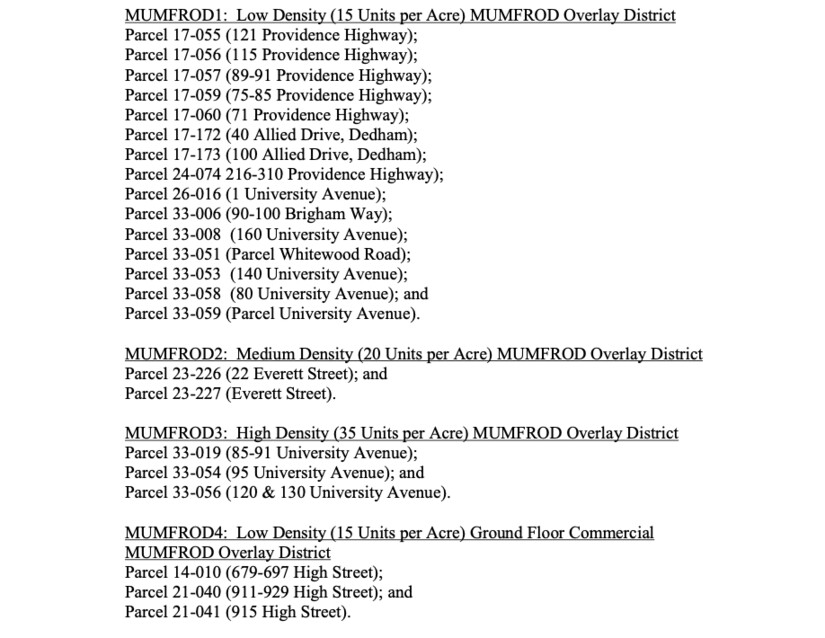Image


Editor's note: In the opinion article by Professor Peter Ittig that follows, the professor raises concerns with Article 21, which Westwood Planning Board is putting forth for Westwood resident-voters' approval at the upcoming Town Meeting of May 6, 2024. Among other things, Article 21 would specifically delineate additional portions of Westwood as Mixed Use & Multi-Family Residential Overlay District (MUMFROD) areas which would not only allow certain types of commercial enterprises, but also would allow multi-family housing development as of right (i.e., without discretionary zoning approval). The delineated areas are:
 Source: Town of Westwood Finance and Warrant Commission 2024 Annual Report, Warrant and Recommendations for Annual Town Meeting at page 40.
Source: Town of Westwood Finance and Warrant Commission 2024 Annual Report, Warrant and Recommendations for Annual Town Meeting at page 40.While it remains to be seen whether any developer would pursue multi-family housing at the above locations, by submitting Article 21 for a vote, Westwood's Planning Board is pursuing compliance with the MBTA Communities Act, through which the Commonwealth of Massachusetts seeks to ensure the availability of affordable housing across the state. Earlier this year, the Town of Milton rejected a land use plan that would advance the state's multi-family housing policy in Milton, and Massachusetts Attorney General Andrea Campbell filed suit to enforce Milton's compliance with the MBTA Communities Act. That case is currently pending before the Massachusetts Supreme Judicial Court.
----
The following opinion article represents the views and opinions of the author, and not necessarily those of Westwood Minute.
By Peter T. Ittig, Ph.D.
The annual Westwood Town Meeting will be held on Monday May 6. Proposed articles include the usual budget articles and an important zoning article concerning permission for high density housing in some Westwood neighborhoods.
Zoning Article
The most controversial article at the Town Meeting is the high-density multi-family housing proposal in Article 21 that is a consequence of the MBTA Communities Act. This proposed zoning change may significantly alter the character of the Town of Westwood. The article specifies which neighborhoods may receive that high-density housing and is shown in the Warrant beginning on page 35. The recommendations of the Finance & Warrant Commission (FinCom) are on page 40 together with a list of affected properties.
Article 21 appears to be premature as the state Supreme Judicial Court (SJC) announced on March 18 that it has accepted a challenge to the constitutionality of the MBTA Communities Act that is scheduled to be heard in October. Major unresolved issues concern whether the Home Rule Amendment in the Massachusetts Constitution (1966) bars the Legislature from requiring towns to make these changes to local zoning, whether the “guidelines” issued by the administration are requirements, what penalties are permitted, if any, to towns that do not comply, and whether the state Attorney General has any authority to enforce compliance.
The FinCom was badly split on this article, which passed with 6 in favor, 5 opposed, 1 voting “present” and 3 absent. A majority of those voting concluded that “compliance is not discretionary”, they were concerned about possible penalties for non-compliance, “potential litigation from the State Attorney General’s office” and they believed that the proposal will “mitigate the risk of undesired changes”. Those opposed were concerned that the proposal “unfairly burdens the residential neighborhood of Islington” and objected that the Planning Board made the proposal without “guidance from external counsel” regarding “these significant alterations to our town’s zoning.”
Zoning in Massachusetts has historically been a matter of primary local jurisdiction. However, the MBTA Communities Act sought to promote more high-density housing in towns served by the MBTA (excluding Boston). The Act provides that the affected towns “shall” permit a “district of reasonable size” for high-density multi-family housing “without age restrictions”, and “suitable for families with children.”
Towns that failed to do so would lose eligibility for certain state grant programs. Specifically, “An MBTA community that fails to comply with this section shall not be eligible for funds from: (i) the Housing Choice Initiative…; (ii) the Local Capital Projects Fund established in section 2EEEE of chapter 29; or (iii) the MassWorks infrastructure program established in section 63 of chapter 23A.”
In 2022 the state housing office issued “guidelines” for affected towns that were widely considered to be unreasonable, and deadlines were set for compliance. Many towns have objected to the guidelines and sought exemptions. None have been granted. The voters of the Town of Milton rejected proposed zoning changes designed to meet those requirements.
The state Attorney General, Andrea Campbell, has taken the position that the affected towns must permit high-density housing sufficient to meet the “guidelines” that the state housing office created, and she launched a lawsuit against the Town of Milton threatening much more severe penalties on towns that do not comply, including possible loss of local zoning authority.
On March 18 of this year, the state Supreme Judicial Court agreed to rule on the constitutional issues on an “expedited” basis at the request of the Town of Milton and the state Attorney General. The case is scheduled to be heard in October. SJC Justice Serge Georges said in his ruling that the Court will consider “the scope of a municipality’s legal obligations under (the MBTA Communities Act) and under the related Guidelines, and whether the Attorney General has authority and standing to enforce compliance with the same.”
The current deadline set by the state for compliance by Westwood is at the end of this calendar year, but the state may need to extend that deadline due to the pending SJC decision. However, the Town could call a Special Town Meeting if necessary to meet a deadline.
An important detail is that changes in Westwood zoning must be approved by the state Attorney General. Thus, if we make these changes now, we may not be able to undo them later after the Court decision.
I recommend voting no on this article at this time. This issue should be revisited after the decision of the state Supreme Judicial Court later this year on the constitutional issues. It seems logical to wait for guidance from the Court before making major changes to local zoning that may seriously alter the character of the Town of Westwood. I also suggest that the Town consider submitting an amicus curiae (friend of the court) brief to the SJC in support of the Town of Milton and expressing the concerns of the Town of Westwood. If possible, this should be done jointly with other MBTA communities.
Related:
Thanks to Professor Peter Ittig for contributing this opinion article to Westwood Minute. Professor Ittig was a member of the of the Westwood Finance & Warrant Commission from 2019 to 2022.
Westwood Minute takes no position on the opinion articles that it publishes, but seeks accurate and thoughtful commentary on topics that matter to our community, from a variety of differing viewpoints. Feel free to reply with your reaction below, or submit another perspective to WestwoodInAMinute@gmail.com.
Updated 4/28/2024 at 7:28 p.m. The upcoming Town Meeting is May 6, 2024 (not May 5th as initially stated). A correction has been made.
Article 21, is not premature, but long overdue. Westwood's failure to change its almost exclusively single-family zoning of residential neighborhoods is already fundamentally altering the character of the town. When my family and I moved to Westwood almost 20 years ago, I found a welcoming community of down-to-earth residents who seemed unconcerned with their status compared to other towns. I don't think that has changed for long-time residents or friends I made when I moved here, but I wonder what happens when the only people who can afford to live in this town have to figure out how to swing a million-dollar mortgage? I wonder how the character changes as long-time residents "cash out" and move to condos in Dedham, Norwood, West Roxbury, Needham or other towns because they literally have so few options to stay in town. I wonder about a generation of kids growing up whose only hope to stay in town is to live with their parents or inherit.
Article 21 does not magically solve any of those problems, but it recognizes that failure to change is also a choice, and it attempts to creatively implement the housing goals adopted by the legislature. It makes certain locations in town, many of which are already developed--some with higher density than required by this zoning--eligible for future multi-family development. No one will be rushing to tear down anything, especially since some of the properties at University Station are already built and new housing to replace an industrial area on Everett Street is underway. As I scour the proposed zoning map, I see many small, carefully chosen parcels designed not to disrupt existing neighborhoods. If the goal were to revolutionize residential zoning, this article is nowhere near even attempting that goal. But it does tweak the existing map of what is possible in way that, over the coming decades, could allow for carefully managed growth that houses people, instead of leaving potential industrial and commercial areas to lie fallow for years.
It is possible that the housing law that spurred this zoning change will end up in court and maybe even ruled unconstitutional. Maybe it will turn out that Westwood didn't "have" to do anything. But I think we should do something and not simply pretend that we can keep things "the way they were" forever. Who longs for the vacant streets and empty storefronts of Islington now? Who misses the periodic truck crashing into the East Street bridge? Is anyone upset that the Tumblebus had to move? And where are those methadone clinics that were going to be opening after we zoned for substance abuse rehab centers? The alternative to being a constructive part of change is to let things happen on their own. Westwood, through its elected and volunteer boards and thoughtful considered action at town meeting, does not just let things happen, and we remain a town of strong character because of it.
If passage means the potential demolition of the 'strip mall' as pictured on high street, it'll be well worth it! Perfect location for building residential apartments above with business space at grade. Town Administration should look at it as an opportunity for redeveloping our end of Westwood and giving the residents a real downtown. It is, and has been, an embarrassing, and dysfunctional, section of Town for longer than I can remember.
Wasn't there a Study Commissioned by the Town with MIT many years ago? Let's dust it off and start thinking about building a real downtown. Passage of this Article would be a win-win situation!